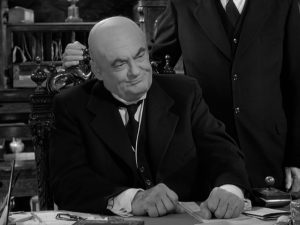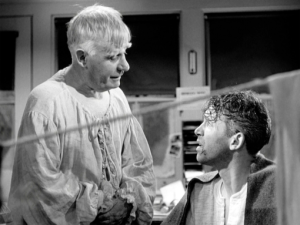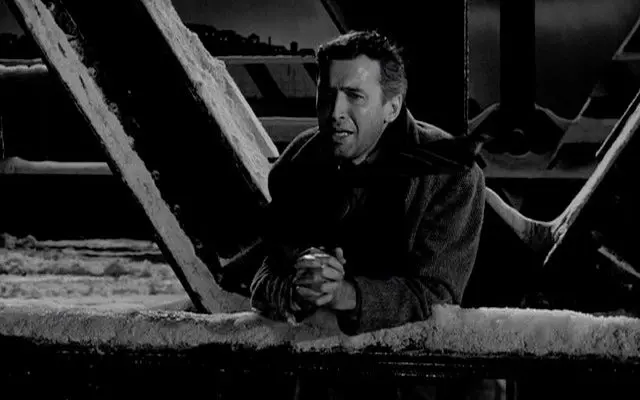The holiday classic film It’s a Wonderful Life (1946) may feel out of place this year. 2020 has been tainted by a pandemic, political strife, injustices, isolation, loss of livelihoods, and loss of lives. Having encountered such brutal reality in one year, can we, like George Bailey, really say that it’s a wonderful life?
In the movie, George Bailey (played by James Stewart) finds that his business is going under, a warrant is out for his arrest, his daughter is sick, his dreams are crushed, his marriage is strained, a wicked man is tormenting him, and his house is falling apart. And yet, he is filled with joy and wonder!
He does not wait for things to get better before declaring “It’s a wonderful life!”
As he bursts into his house and sees the sheriff there holding out a piece of paper, George announces, “I bet that’s a warrant for my arrest—isn’t it wonderful—I’m going to jail!” Without a hint of sarcasm, he also proclaims, “Oh, look at this wonderful, old, drafty house!” The people gathered in his house look at him as if he’s off his rocker. They likely can’t understand how a man going through such a hard time can still be happy.
Hopefully, that’s exactly how people are looking at Christians right now—with quizzical stares, curious about how we can still be rejoicing and hopeful despite all the problems of 2020. Then they might ask us how it’s possible that we can grieve yet simultaneously have hope, creating an opportunity for us to share the gospel.
Unless … our reaction to hardship in life mirrors that of those who don’t know Christ, grieving without any hope, dominated by just as much fear and despair regarding illness, death, finances, and politics?
If so, we have a lot to learn from George Bailey. How is he able to believe that his problem-filled life is wonderful?
Here are six ways George Bailey arrives at his wonderful discovery (the first three are below; the last three are in part 2). May they help us leave the bridge of despair and join in George’s joy.
1. Forfeiting “Something Big and Important”
When George’s father wants him to work at the family business, Bailey Building and Loan, George replies, “I couldn’t face being cooped up for the rest of my life in a shabby little office . . . I want to do something big and something important.”
His father responds, “You know, George, I feel that in a small way we are doing something important. Satisfying a fundamental urge. It’s deep in the race for a man to want his own roof and walls and fireplace, and we’re helping him get those things in our shabby little office.”
That isn’t good enough for George though. He doesn’t yet realize that ordinary work can make extraordinary differences.
He proclaims: “I’m shakin’ the dust of this crummy little town off my feet and I’m gonna see the world . . . And then I’m gonna build things. I’m gonna build airfields, I’m gonna build skyscrapers a hundred stories high, I’m gonna build bridges a mile long. . . .”

Mr. Potter (Lionel Barrymore) at his desk
But those dreams never come to fruition. George ends up taking over his father’s business after all. Mr. Potter, the richest and meanest man in town, wants to see the downfall of Bailey Building and Loan so that he can take control of the town as sole banker. To get rid of the competition, he tries to convince George to join his staff. He chides George for living as if he is just a “common, ordinary yokel,” choosing to stay trapped in this small town and frittering his life away.
Mr. Potter tells George his ship has now come in and to climb aboard. As much as George wants to do something big and important, he refuses to climb aboard Mr. Potter’s wicked ship.
George makes a virtuous choice. He gives up “something important” because he knows joining Mr. Potter is the wrong path.
But staying on the ordinary path leaves George still feeling as if he is just “frittering his life away.” George does not grasp the significance of his work, until he sees that the town would have become ruinous if he had never been born. He then realizes his small actions had made a big impact. He had deeply influenced individuals, who in turn influenced others in a positive domino effect.
He did build things. Not skyscrapers or bridges, but a community. A family. Love. He helped people build their own homes. He helped build a good future for others.
Even your seemingly ordinary work can make a difference.
When you start to get discouraged and feel like a “common, ordinary yokel,” remember that even your seemingly ordinary work can make a difference. If you’re making virtuous choices, loving your neighbor as yourself, and committing your work to the Lord (Proverbs 16:3), your life is having an important impact, even when you can’t see it. Trust that God will turn the small seeds you plant into a great harvest.
2. Receiving Clarity from Clarence
George doesn’t realize the impact his life had on others until the angel Clarence reveals it to him. When Clarence places George in an alternate reality—one in which George doesn’t exist—George sees the profound impact he had on others’ lives. Clarence tells him, “Strange, isn’t it? Each man’s life touches so many other lives. When he isn’t around he leaves an awful hole, doesn’t he?”
If you weren’t around, you’d leave an awful hole as well. But sometimes we can’t see that. We look in the mirror of the present and the image can be tarnished. We look to the past and sometimes all we see is the wreckage we left in our path. We look to the future and stare in fear, wondering if the world would be a better place without us. The good we’ve done and the impact we’ve had can be blind spots in our vision. No matter how much we squint and stare, we can’t see that our lives matter. Like George, we may begin to think, “I suppose it would have been better if I’d never been born at all.”

Clarence (Henry Travers) and George
That’s why it’s vital we become a Clarence to one another. Clarence shows George how dark the world would be without him in it. He shows him that there’s hope and gives him a fresh view of life. We must do that for one another. We must take the time to let others know they matter in our lives. We should help reveal to others that their virtuous and selfless actions have had—or will have—a positive domino effect on the world if they do not give up. Otherwise, they might become discouraged. Scripture acknowledges our predisposition to weariness and encourages us to instead persevere: “Let us not lose heart in doing good, for in due time we will reap if we do not grow weary” (Galatians 6:9).
It will take humility to point out the good in others, so we should remember the command to “with humility of mind regard one another as more important than yourselves” (Philippians 2:3). Look at others—see for them what they can’t see in themselves. Take the time to notice and the time to tell them. And when others are blinded and can’t see for themselves that life is wonderful, show them. Let them borrow your eyes to see it.
3. Investing in the Currency of Heaven
George shows that although there’s not much money in his pocket, his soul is full of riches: love, friendship, and sacrifice. In fact, he even empties out his pockets on more than one occasion. When there’s a run on the bank, he and his wife give up their honeymoon money to help the struggling customers. Later, when George’s friend Violet is in need, he doesn’t hesitate to give her not only a good reference but also money.
George recognizes the value of being rich in good works—even if he doesn’t always see the value in his own good works. When Mr. Potter speaks out against George’s father, George reminds Potter that his father helped people, and they “were human beings to him. But to you, a warped, frustrated old man, they’re cattle. Well in my book, my father died a much richer man than you’ll ever be!”
It’s the portrait of George’s father hanging on the wall of Bailey Building and Loan that gives us a reminder of the value of giving. Underneath the portrait, a plaque reads, “All you can take with you is that which you’ve given away.”
The Bible encourages a similar perspective. Paul writes that those who are rich in this present world should not set their hope on the uncertainty of riches, but on God. They should do good, be rich in good works, be generous and ready to share, “storing up for themselves the treasure of a good foundation for the future, so that they may take hold of that which is life indeed.” (1 Timothy 6:17-19) By giving away, we get to take hold of a life that matters and gain lasting treasure for our future, eternal home.
Those who are rich in this present world should not set their hope on the uncertainty of riches, but on God.
As George gives away, he gains relationships that will last into eternity. His soul, which he’ll take with him when he dies, becomes richer in lovingkindness and good works.
However, like us, George isn’t generous and self-sacrificing simply by default. His life consists of moments of success and setback, each shaping potential futures, and determined in some part by our reaction to them.
As George’s life is beset with worries, he stops investing in things that will last. After his Uncle Billy accidentally loses a large amount of money, George yells at him: “Where’s that money, you silly stupid old fool? . . . Do you realize what this means? It means bankruptcy and scandal and prison! That’s what it means! One of us is going to jail; well, it’s not gonna be me!”
George storms out of the office and goes home frazzled. His son Pete exclaims: “Daddy, the Browns next store have a new car. You should see it.” George snaps back: “Well what’s the matter with our car? Isn’t it good enough for you?” Of course, their car is good enough for Pete—he is just excited about cars. George’s response indicates it’s not good enough for George himself though.
His house and town are no longer good enough either. He rants to his wife: “Gosh, it’s this old house . . . This drafty old barn! Might as well be living in a refrigerator. Why did we have to live here in the first place and stay around this measly, crummy old town?”
Ultimately though, after George sees what the world would have been like without his sacrifices and generosity, George is reminded that investing in relationships is more important than gaining material things. George regains his prosperous soul. When the sheriff holds out a warrant for George’s arrest, George doesn’t put the blame on Uncle Billy. He is willing to go to jail in place of his uncle.
George gains the currency of heaven, and he is the richest man in town because he is rich in relationship, as Ken Boa explains in his film commentary video series. Ken teaches, “If a person can transmute the currency of earth . . . and invest it in relationships, that’s what is going to endure forever.”
When we lose focus of heaven’s currency and prefer earth’s currency, here’s a prayer from Valley of Vision that we can pray to help get us back on track: “May I never think I prosper unless my soul prospers, or that I am rich unless rich toward Thee.”
Guest post by Hannah Zarr.
Read part 2. Also, here are some suggestions for further reading and watching:
- “Film Commentary Series, Ken Boa on It’s a Wonderful Life”: In this teaching video, Ken Boa explores the themes, characters, and underlying motifs of It’s a Wonderful Life, revealing how the film points beyond itself to something greater.
- “Films with Spiritual & Moral Themes” article: Ken Boa lists It’s a Wonderful Life as a film with a “good synthesis of artistic merit and spiritual themes.” Have you watched the other films on the list yet?
- “Ken Boa’s ‘Safe’ Film List (and Other Recommendations)”
- This “Films and Leadership” article explains how It’s a Wonderful Life also teaches valuable lessons for leaders. One CEO watches the film every year as a “refresher course in leadership.”
If you want to do more giving this Christmas, please consider donating to Reflections Ministries. Click here to donate.



